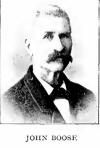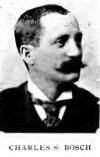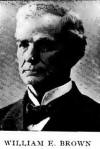|

| |
EBENEZER
B. BISHOP was the son of Robert Hamilton
Bishop, D. D., first president of Miami
university, who was born in North Britain. Mr.
Bishop was graduated from Miami in 1833. He
early entertained the idea of becoming a minister and
accordingly entered a theological seminary to prepare
himself for the pulpit.
He was an indefatigable worker in the cause of
religion, acquiring a wonderful knowledge of it, which made
him a general and accurate scholar. He was an able and
good minister. As a writer on religious subjects he
had few superiors. He was a professor at the Trenton,
Tennessee, college. In 1867, he was elected
Superintendent of the Hamilton schools and continued in this
capacity until 1871. He was a gentleman of rare
culture and attainments and discharged his duties as
Superintendent with zeal and ability, and gave the schools
excellent service. He possessed some of the
peculiarities of his father, who willed, ' 'That his body
after death be given to the directors of Farmers' college,
to be placed in a plain coffin, and then enclosed in a
square, strong box and deposited in an artificial mound, in
a designated spot in the college yard, to consist of
successive layers of earth and sand, net to be less than
eight feet, solid measure No artificial monument to be
erected on it unless it should be a few evergreens or
shrubbery."
Mr. Bishop removed from Hamilton to
Paris, Illinois, and was elected principal of the Edgar
academy. He died January 4, 1877.
Source: Biographical & Historical Sketches - A
Narrative of Hamilton and Its Residents from 1792 to 1896 -
Publ. 1896 - Page 111 |
| |
WILLIAM
H. BLAIR - Was born in Hamilton, February 14, 1818.
His birth place was the Blair homestead, situated on
Water, near Market street, on the site now occupied by the
old Black & Clawson Co. building. He was
educated in our public schools. He was commissioned
Postmaster of Hamilton by President Lincoln
April 23, 1861, and served continuously except a short
interval, until 1873. Mr. Blair was a
genial, accommodating and popular official, and gave our
citizens an excellent mail service. His death occurred
February 27, 1887. Charles Potter was Mr.
Blair's efficient Assistant Postmaster.
Source: Biographical & Historical Sketches - A
Narrative of Hamilton and Its Residents from 1792 to 1896 -
Publ. 1896 - Page 124 |

John Boose |
|

Charles S. Bosch |
CHARLES S. BOSCH, the
Chief Executive of Hamilton, was born in Butler county, July
11, 1858. At the age of eleven years his parents moved
to Hamilton, when he entered the public schools, where he
remained until he was fourteen years of age. In 1872,
he decided to learn the profession of printing, and entered
the offices of the Butler County Democrat and
National Zeitung under the management of T. H.
Hodder and L. B. De La Court. A short time
afterward he went into the cigar business and subsequently
accepted a position as depot master with the C. H. & D.
railroad.
He was a member of the Board of Education from the
Fourth ward for four years, and was clerk of the board
during his last term. In April, 1893, he was nominated
for Mayor on the independent ticket. With three
candidates in the field he was elected by a plurality of
186. Mayor Bosch is thoroughly
identified with the prosperity and growth of our city, and
is personally popular. He always takes a prominent
part in politics.
Source: Biographical & Historical Sketches - A
Narrative of Hamilton and Its Residents from 1792 to 1896 -
Publ. 1896 - Page 142 |
| |
LEROY
D. BROWN was born in Noble county, November 3, 1848.
He attended country school about six months each year until
he arrived at the age of fifteen; and he was obliged to
labor the rest of the year. In his younger days so
eager was his thirst for information that he read every
volume in the school library. At the age of fifteen
having been able to obtain the consent of his father, he
left home and enlisted in Company H, 116th Ohio Volunteer
infantry, serving until the close of the Civil War. He
served under Generals Cook, Hunter,
Siegel, and participated in the battle of Winchester,
under General Phil. Sheridan.
Afterward he was transferred to the Army of the James, near
Richmond. When mustered out he was Sheridan's orderly.
Upon his return home he attended district school, and
afterward entered High school at Seneca, Ohio. In
December 1866, he began his career as a teacher in Noble
county, and in April 1867, he entered Mt. Auburn academy,
where he fitted for college, and in 1869, joined the
preparatory department of the Ohio Wesleyan university, at
Delaware Ohio, from which institution he was afterward
graduated. In 1875, he was made Superintendent of the
schools of Eaton. This position he filled with credit
until he was elected Superintendent of the Hamilton schools
in 1879. He served a term as trustee of the Dane Free
Library; is a post-graduate student of Cincinnati
university; was admitted to the bar in 1878. He served
one term as State School Commissioner. After his term
of office expired he removed to Colorado Springs, Colorado.
He is now located at Dos Angeles, California.
Source:
Biographical & Historical Sketches - A Narrative of Hamilton
and Its Residents from 1792 to 1896 - Publ. 1896 - Page 115 |

William E. Brown
|
WILLIAM E. BROWN,
President of the Second National Bank, of Hamilton, was
born in Xenia, Greene county, Ohio, Nov. 13, 1825.
His father was a mechanic of moderate means, and his son
was obliged to obtain an education by his own exertions.
He made his own start in life, and by industry has
accumulated a large and valuable estate. He was
early taught to labor, and at the age of seventeen was
in Northern Mississippi, a journeyman shoemaker.
He subsequently passed eighteen months in New York City.
At the age of twenty-one he commenced the study of law
in Xenia. He completed his preparatory legal
studies in Dayton, and was admitted to the bar on the
29th of March, 1849. The following spring he
settled in Hamilton, with very little money. Up to
this time he had worked at his trade to pay expenses.
Before the expiration of his first year's practice in
Hamilton, he had business enough to support himself.
He married the daughter of Robert Beckett in
1852. In 1855 he was elected an elder in the
United Presbyterian church of Hamilton. He gave up
the practice of law for a while on account of impaired
health, but afterward resumed it. He was elected
president of the Second National Bank of Hamilton, in
1870. Under his able management this institution
has nearly trebled its business. It was, in a
great measure, through his advice and direction that the
handsome building of this bank was built. Mr.
Brown is not only a thorough lawyer, but he is also
an energetic man of business and a safe counsellor.
He is a man of strong character.
Source:
Biographical & Historical Sketches - A Narrative of Hamilton
and Its Residents from 1792 to 1896 - Publ. 1896 - Page 247
Portrait between pps. 168 & 169 |
| |
|
NOTES:
|
![]()
![]()
![]()
![]()